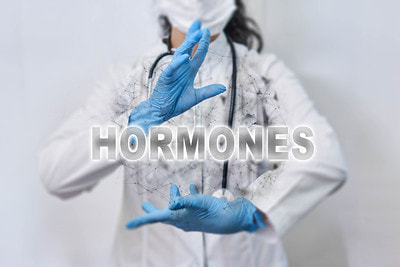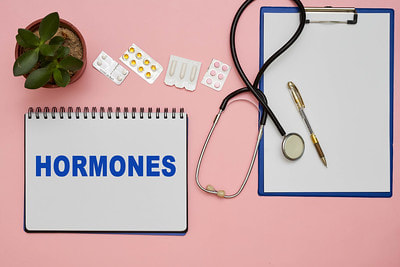My thoughts on testosteroneI spent many paragraphs in my last post talking all about estrogen and progesterone. So now it's time I spend a little time highlighting testosterone. Before I dive in, my warning for this message is that by virtue of talking all about testosterone, I will again be talking about reproductive organs and sexual function. Specifically. In depth. So now you've been warned. First up, let me dispel the common myths.#1 Testosterone is not addictive. The FDA does classify it as a controlled substance (which involves extra rules around prescribing, refills, and monitoring), but it is not addictive. Other prescriptions that are controlled substances do have the potential for creating addictions (such as opioids), but testosterone is not one of them. They just all got thrown in the same "control level" bucket. #2 Erectile dysfunction (ED) does not always mean low testosterone. One potential sign of low testosterone can be low libido (sexual interest, arousal) and/or ability to get or maintain erections for penis-owners, but it's no guarantee. I do run hormone panels on all patients with symptoms that are potentially influenced by hormone levels, but not every case of ED is due to low testosterone. And even for those who do experience ED, have low testosterone levels, and are on testosterone-replacement therapy, not all cases of ED respond to higher testosterone levels. Well, then, what gives?Bodies are complex. Hormones are complex too, and while many of my patients may be forgiven for thinking that I believe that every possible condition is always due to hormonal dysfunction, that's just not the case. Hormones are important, hormone deficiencies can wreck someone's quality of life, but not everything is due to low hormones. ED included. There are many other systemic health factors that influence the hormonal and vascular health of penises. Cardiovascular disease, diabetes, and peripheral vascular diseases are just a few other potential causes of ED. If you are concerned about ED your doctor should not just be checking your testosterone level. There is a lot more to investigate. Testosterone: not just for menTestosterone is an absolutely critical hormone for everyone. I work with many patients to restore their testosterone to levels that work better for them and their quality of life. That list includes cis-gender men, cis-gender women, trans-gender men and gender-diverse folks. Low testosterone levels can impact pretty much anyone's quality of life. Testosterone gets caricatured as just important for body-builders, libido and erections, but its effects are so much further reaching than just that. Testosterone is important for mood health, a sense of vitality, well-being, energy, and motivation. I have lost track of the number of patients who report that, "I just feel better. I feel like myself again" once low testosterone levels are addressed. Often, low testosterone levels feel blah. Blah mood. Lowish energy. Exercising regularly but feeling like no matter what you do, you never progress, never get stronger. Feeling totally apathetic. No interest in things that someone previously derived joy from, whether that is hobbies, physical activity, or sex. It's a very important hormone in helping us feel good. Testosterone is also a vital anabolic hormone for our musculoskeletal system. That means it's a signal that tells our bodies to build more cartilage, ligament, tendon, and muscle tissue. Those messages are essential when healing from an accident, injury, or surgery. But they're also critical in maintaining adequate muscle and cartilage levels as we age. Low testosterone levels are associated with muscle wasting (sarcopenia) and degenerative joint disease. Degenerative joint disease is also known as osteoarthritis, the most common type of arthritis. Often just attributed to "wear and tear," osteoarthritis is actually a very dynamic process that responds to our bodies' levels of nutrients, inflammatory levels, and hormones (among many other factors. Pick my brain at your next visit to chat more about this). Studies have shown that (cis)men in the lower percentages of testosterone develop more cases of osteoarthritis, they are more severe, and they eventually need total joint replacement surgeries earlier than their counterparts (same age) who have higher testosterone levels. Not abnormally high, just in the top-half of the normal range, rather than low-normal or pathologically low. What can I do on my own to support testosterone?Similar to the hormone support plan I mentioned last time, testosterone also benefits from paying attention to nutrition, hydration, physical activity, sleep, and stress levels. I won't rehash the entire message from last time. With testosterone, a focus on adequate protein levels is of particular importance. That, and providing your body with resistance activity so that it can use the testosterone (whether that's just what your body makes, or with the help of hormone supplementation) to build muscle fibers, vascular health, and support brain neurochemistry. The list goes on. But it all starts with resistance activity. Many, many types have been studied, and shown to have an immediate boost on research participants' innate testosterone levels. It seems that nearly any type of physical activity that pushes your body and makes your muscles work will do. That includes weight lifting, CrossFit and other high-intensity interval training options. Heck, even cutting wood boosts testosterone. I tell patients to move their bodies in ways that they enjoy. Some enjoy the camaraderie of a group fitness class. Others love getting out and rock-climbing in the great outdoors. Do what you enjoy, and add a little challenge if you feel you need it. I have low testosterone. Do I have to do shots? There is no type of testosterone treatment that is mandatory. Even if you have low testosterone, you do not have to do anything about it. That being said, you may want to. As mentioned previously, testosterone levels affect quality of life: mood, energy, libido, physical performance, sexual interest and function. So, for those reasons, a testosterone replacement trial is often begun. And that is just what it is. A trial. Not required. We're just seeing if increasing low testosterone levels improves the reasons that brought someone in to see me in the first place (or maybe these were concerns brought up later on). Vagina-owners who are seeking improvement in their quality of life, but not the masculinizing effects of testosterone do not get shots. Often a cream containing the testosterone prescription is used. Any testosterone prescriptions for this category of patients are compounded. That means we must use a compounding pharmacy. Your typical commercial pharmacy (Rite-Aid, Walgreens, etc.) does not have any type of testosterone appropriate for these patients. I could go into a whole tirade about how that's due to the fact that our medical establishment doesn't recognize testosterone as being important for my female patients, but I'll leave it at that. For penis-owners and/or those looking for masculinizing effects of testosterone, 99% of the time we do just injections (which are available from commercial pharmacies). There are other options out there (primarily creams and gels), but they come with quite a few down-sides, so often shots are the way we go. Injecting yourself can be scary for anyone who's never done it, but with a few tips, and a bit of practice, it is a breeze for most everyone. I have given thousands of injections to patients, I have injected myself many, many times, and I am happy to show anyone the self-injecting ropes when need be. Then what happens?Well, the effects of the testosterone kick in. Some people notice an effect very quickly, within the first few days. By and large all these hormones we've been talking about (estrogen, progesterone, and testosterone), when replaced, tend to build up in someone's system over the first few weeks. I often check in with patients about a month out, to make sure positive effects are being seen, make any dosage changes necessary, and address any unwanted effects that may arise. Monitoring involves rechecking labs usually a few times in the first year of replacement, and annually in the future if no changes are being made. These are necessary to verify accurate testosterone dosage, long-term safety, and check for aberrant hormone metabolism (some will break down too much of their testosterone into estrogen, which can create secondary issues). Additional requirements of testosterone replacement therapy are continuing annual exams, and following any further recommendations given such as PSA monitoring and urologist visits. These are no longer recommended annually as a general rule for all (cis) men who are on testosterone; I leave that up to the discretion of the primary care provider. Again, no aspect of this is mandatory. For those who have low testosterone, and choose replacement, the timeline on replacement is up to them. We are talking about addressing impacts to one's quality of life, not any medically unsafe situation that absolutely requires medicating. Testosterone replacement, like any hormone prescription, works for the duration that someone uses it. Our bodies change over time. Obviously. And along with that comes changes in what hormone levels are "expected" (as in, hormone deficiency symptoms arise when levels are below that). So any hormone plan I craft with a patient is always tailored to fit them, their initial concerns, their response, and their continued need for the hormone. When should you reach out? Whenever you need more support, of course. Whenever your current plan is not working for you. Whenever you need new ideas, new investigation, new treatment suggestions. I am pretty good at brainstorming. Through my decade of practice, and doing so much hormone testing, prescribing, and problem-solving through that time, I nearly always have a Plan B. And Plan C. And Plan D, E, F, etc. Don't settle for a plan that isn't working for you. That's all I have for todayI hope that this has been helpful for those who have gone the route of testing and prescribing, for those who are curious, for those who have been told maybe they should pursue that route, and also I hope this was helpful even for those who are very hormone-wary. I welcome all questions and concerns as I am working through hormone investigation with my patients.
Next time I'm going to cover the weight loss injection medications. Ozempic. Wegovy. Semaglutide. I was naive enough to think that I could just ignore this huge trend in medicine, but I can no longer. So I will dive into my thoughts on the whole debacle around these medications, use, side effects, long term safety, and more. I won't be able to hold back from bringing out my soapbox on the larger topics of anti-fat bias - in medicine, in society, in our own mindsets. I'm sure it will end up being quite the novella. So stay tuned for that. If you wish. Yours in health, Dr. Angela Cortal
0 Comments
(If you don't want to read anything about estrogen, progesterone, ovaries, vaginas, and uteruses - stop reading now and join me next time) I would like to share a series of messages geared towards education on health topics. This blog is open to everyone, so of course I am not diagnosing or treating any medical condition (ok, I think my malpractice lawyers are happy now). With that being said, I feel that there is a lot of information all people can and should have easy access to. Education, awareness, and some tools that anyone can learn about on their own. Female hormones... What exactly are we talking about here?First, a note on terminology. I used the phrase "female hormones" above so that anyone interested in this topic would know generally what I will be talking about. But with that being said, I prefer to use more accurate terminology such as "testes owners”, "ovary owners”, "vagina owners”, "uterus owners”, all just depending on the subject. The reason for this is that I want to give the right information to the right person (or those who know and love them). Many of my female patients have had a hysterectomy, so "uterus owner" information would not be relevant to them. The more specific the terminology, the more useful. Same thing with menstruating versus not menstruating. There are different priorities, hormone imbalances, and self-care ideas that will be relevant depending on one's menstruating status. That's why I use very specific phrasing, which may be new to you, but I don't think will be confusing to anyone. You only have to know what reproductive organs you have to follow along. Hormones at play So for today, I am going to focus on estrogen and progesterone. Everyone has all three sex hormones (estrogen, progesterone, and testosterone), but it's the estrogen and progesterone that are of particular importance for menstrual, peri- and postmenopausal concerns. Through the menstruating years, every menstrual cycle is a roller coaster of estrogen and progesterone. The estrogen typically peaks the week of and week after the menstrual period itself, then the progesterone peaks the two weeks following that (presuming a 28-day cycle where ovulation is happening). Menstrual concerns are varied. A top-of-my-head list includes long cycles, short cycles, no menstrual cycle appearing, spotting mid-cycle, bleeding mid-cycle, heavy cycles, clotting, cramps, breast tenderness, mood swings, insomnia, fatigue, anxiety, depression, constipation, and low back pain just to name a few. Menstrual cycles, and some appearance of physical and sensation changes, are completely normal. But when those hormone shifts are impacting one's quality of life... then that's time to get some professional support. Same with menopause. It is a natural stopping of the menstrual cycles (along with stopping ovulation) when those fluctuating hormone levels have come to rest at a level too low to trigger menstrual cycles and changes. For some, it's an easy, breezy transition. But for many, it can be a time that hormone shifts can again significantly impact quality of life. That can include hot flashes, night sweats, insomnia, fatigue, difficulty concentrating, memory issues or foggy headedness, anxiety, depression, joint pains, libido changes, vaginal dryness and/or discomfort. Long-term post-menopausal hormone deficiencies can also be a risk factor in the development of osteoarthritis, cardiovascular disease, dementia, and osteoporosis. There are a lot of factors that go into my initial investigation with new patients. But if some (or many!) of these concerns are present, we are often ordering lab testing. If insurance covers other testing ordered by me, such as blood sugar and thyroid tests, they cover hormone testing as well. The only insurances that don't cover lab testing by me are Medicaid plans, Medicare plans, and Kaiser. Regardless of hormone testing and test results, there are some common tips and tools that anyone can use at home to care for their hormones. Self-care for top concernsA hormone support plan often includes attention to nutrition, hydration, physical activity, sleep, and stress levels. I will dive into each of these topics. Nutrition building blocks for hormones include protein, fats, and fiber. Getting in enough protein daily ensures that your body can create and circulate proper hormone levels. Healthy fats (such as pastured meats, eggs, also coconut, avocado, and olive oil) are also important. Did you know that the backbone of every single hormone is a complex fat molecule? People who have low cholesterol are actually at a potential disadvantage as they may be at greater risk for hormone deficiencies. Fiber and hydration come up in particular for menstruating concerns. As the estrogen and progesterone alternately spikes then drops through the cycle, our bodies have to respond by increasing production (when one is supposed to be spiking) then increasing the breakdown (when it is supposed to be declining). Many hormonal imbalances have an estrogen dominant aspect to them. That is a big subject, but one important aspect is to help facilitate the breakdown of estrogen. That is where the fiber and hydration come into play. Both soluble and insoluble forms of fiber help in the body and specifically in the digestive system to help get out the hormone metabolites (waste products) when it is time for them to go. Dietary sources of fiber include nuts, seeds, vegetables - especially broccoli, cauliflower, kale, chard and salad greens. If you need a little fiber boost, adding one or two tablespoons of flaxseed meal into food is an easy way to do it. Everyone has different hydration needs, but generally an intake less than 48 oz of water daily will lead to constipation and more sluggish bowels (thus slower elimination of those hormone metabolites which can lead to them getting reabsorbed from the bowels). Sleep and stress reduction come into play as our restorative times are the times that encourage more production of progesterone, a naturally calming hormone. High stress levels provoke more production of cortisol. Cortisol, in appropriate levels, is the hormone that helps us wake up naturally. But in high levels it is often called "the stress hormone," and can be involved in long-term high-stress symptoms of insomnia, anxiety, heart palpitations, and more. Now I'm going to talk about vaginas. A lot.Everyone has had ample time to leave if this is not a topic for them. But for my vagina owners out there, this message is for you. A few vagina self-care tips: --- Don't stick anything in your vagina to clean it or get rid of an infection. Seriously. If you think you have an infection, seek care from the provider who does your pap exams so you can be tested for an infection. Don't treat it yourself (don't google herbs and start sticking them up there!). I have seen what effectively was a vaginal chemical burn, caused by insertion of food/herb items that could be picked up at a grocery store. Don't do it. Vaginas are the original self-cleaning oven. Yes, I'm joking. But in all seriousness, they don't need cleaning inside. --- If you are prone to recurrent UTIs or vaginal infections (or dysbiosis such as BV), then you probably know that you have to take extra vaginal/ vulvar care precautions. Wearing cotton underwear, showering immediately after exercise, cleaning/ showering after sexual intercourse (with partners and/or toys), being very careful with soaps and lotions, wiping front to back with toilet paper and maybe even buying bleach-free toilet paper. If you still find yourself very sensitive to recurrent infections or dysbiosis, talk with your provider(s) about what test treatment steps may be available for you. --- Use lubricant. If you have a vagina, and you engage in any type of sexual activity that involves said vagina, just do it. Use lube. Yes, all vagina owners. Yes, even if you don't experience any type of vaginal dryness or discomfort ever. Yes, still use it. Using silicone lubricant helps keep vaginal tissue healthy. It lowers the risk and rate of vaginal infections (and dysbiosis). It protects vaginal tissue during sexual activity and keeps it plump and intact. It provides a barrier that helps those who do experience vaginal dryness, discomfort, and pain. It is good for all vaginas. If you prefer using a water-based or oil-based lubricant, go right ahead. Any lubricant is better than none. --- More on vaginal dryness: It is very common around menopause. It can start before, during, or after the transition of periods stopping. If it is minor, and occasional, and silicone lubricant just isn't doing enough, you may want to look into hydration pearls (Bezwecken is one such manufacturer). When we do need to step up the plan into hormone replacement territory, vaginal cream is a very common format I am using. It is terrific (and fast acting) to reverse vaginal dryness, but it actually works great for all manner of peri- and postmenopausal-related hormone deficiencies. This is because applying hormones to vaginal tissue is the #1 way to get a slow and steady daily dose from a hormone prescription. When should you reach out?Whenever you need more support, of course. I am here to investigate and offer treatment solutions when what you have been doing previously isn't working, or isn't sufficient. Or when the plan had been working great, but now is not working out so well. Or when you have been told that it's pointless to check your hormones or nothing can be done because, "it's normal for women, normal for your age," or some such aggravating and useless sentiment. When you need things checked into, I am here. When you need to talk hormone prescriptions, I am here. I prescribe several forms of hormonal birth control (pretty much every type of prescription contraceptives except IUDs) and the options for prescription hormone supplementation are extensive. I always want to do my best to match each person up to the hormone type, format, and dosage that is right for them. Sometimes that takes a few tweaks early on, but I don't rest until the hormone replacement plan is working, and working wonderfully. I also want to do my best in terms of monitoring and providing the most effective treatment at the lowest potential for side effects, which includes hormone lab testing. If you would like to learn more about the history of hormone replacement therapy research, and why it seems there is so much disagreement out there in the medical community about hormones and hormone replacement, I suggest you read Estrogen Matters by Dr. Avrum Bluming. He is a breast cancer oncologist who really clearly communicates the research findings, and what actual health risks there are to hormone replacement (versus potential hormone deficiencies). OK, that's all I have for todayI hope that this has been helpful for those experiencing menstrual, menopausal, and vaginal concerns. Or those who know someone who could use this info, in which case please pass it on!
And next time, we will be talking all about testes and penises and testosterone, so now you've been forewarned. I hope we all get to see a little sun this weekend, Dr. Angela Cortal |
Archives
June 2024
Categories
All
|
about the doc |
patient infocontact |
|
Privacy Policy
© Copyright 2011-2024, Dr. Angela Cortal ND LLC website content is for educational purposes only and is no substitute for medical advice (see the Terms of Use Agreement for this site), you must establish a doctor-patient relationship to receive that! |






